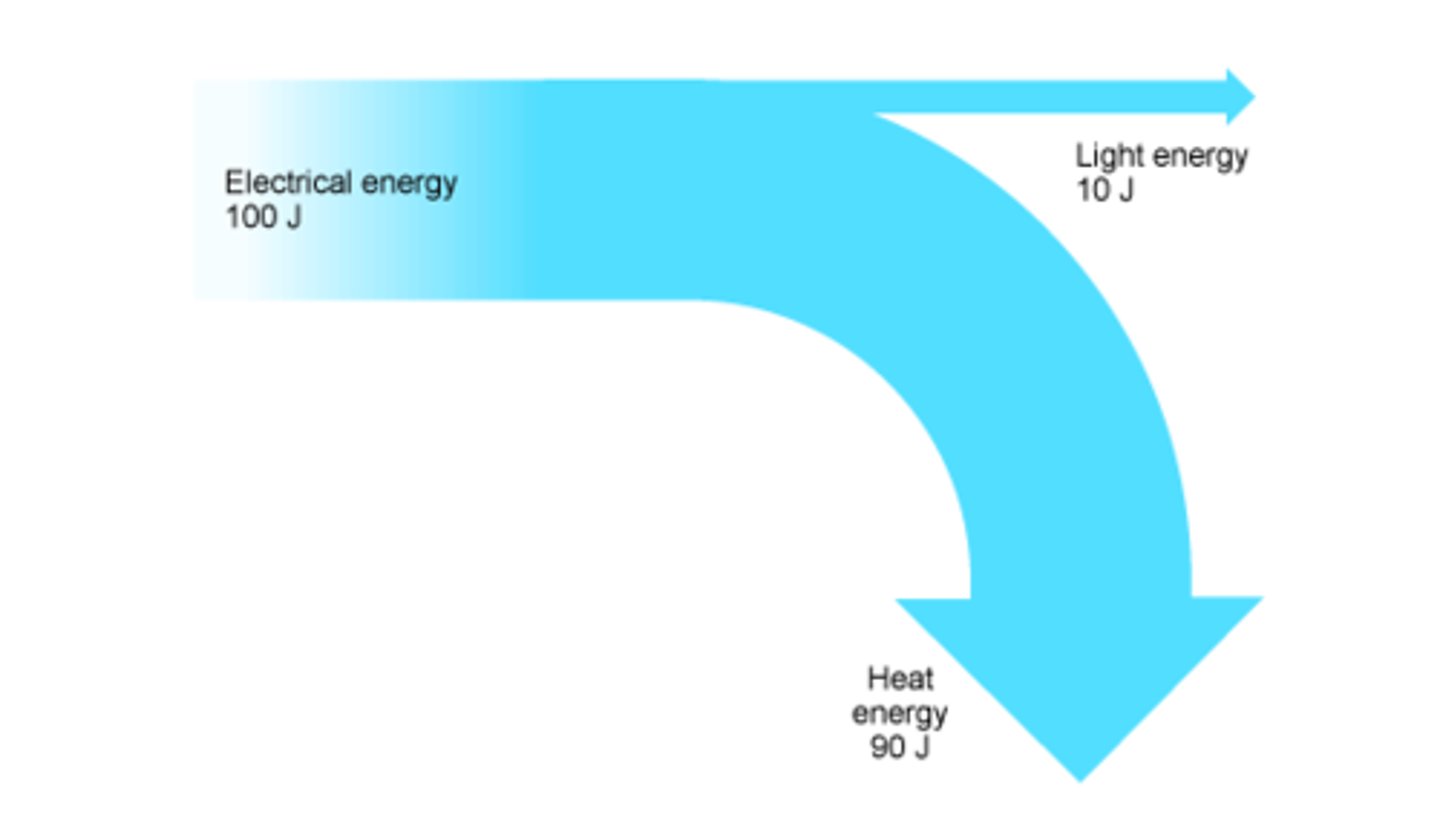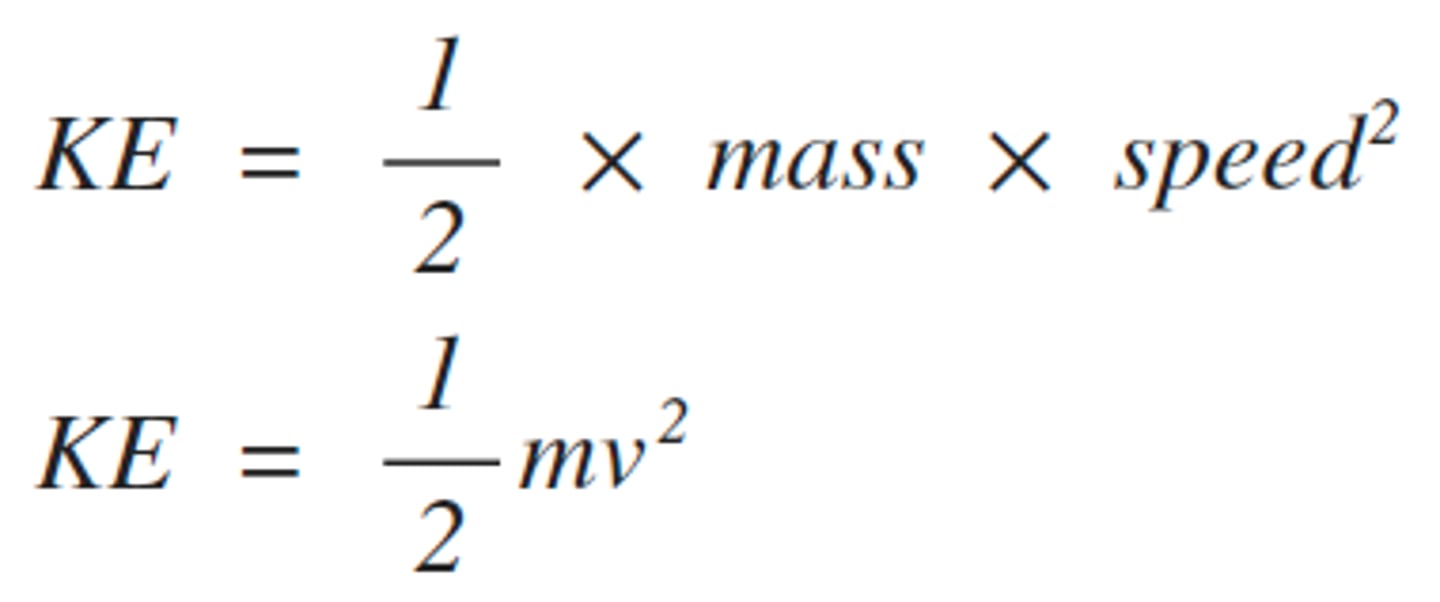Edexcel IGCSE Physics : 4 Energy Resources and Energy Transfers
1/30
There's no tags or description
Looks like no tags are added yet.
Name | Mastery | Learn | Test | Matching | Spaced |
|---|
No study sessions yet.
31 Terms
List the methods of energy transfer
mechanically
electrically
by heating
by radiation
List the energy stores
chemical
kinetic
gravitational
elastic
thermal
magnetic
electrostatic
nuclear
State the principle of conservation of energy
Energy cannot be created or destroyed , energy is always conserved and can only be transferred from store to store
State the relationship between efficiency, useful energy output and total energy output

Describe the energy transfers of everyday and scientific devices , including Sankey diagrams
when drawing a Sankey diagram you draw connected arrows
to the left of the arrow you write the total energy
at the end of each arrow you write the store which it has been transferred to

How can thermal energy transfer take place ?
conduction
convection
radiation
How does thermal energy transfer take place by conduction ?
when part of a conductor gets heated
the particles being heated gain kinetic energy and move faster
they therefore collide more often with the particles next to them and transfer kinetic energy to them
this repeats till it is transferred to the whole object
How does thermal energy transfer take place by convection?
when a fluid is heated
the bottom part close to the heat , gains ke and becomes less dense
the warmer fluid then moves upwards as it is less dense
the upper part of the fluid therefore moves down and the heated part moves up
the upper part then cools down and becomes more dense meanwhile the bottom part heats up and becomes less dense
they then switch place
this repeats as a convection current
How does thermal energy transfer take place by radiation?
thermal radiation given off by the sun
infrared waves transfer energy to an object increasing its thermal energy store
the object absorbs infrared waves and heats up
Explain how convection can cause everyday phenomena?
• Off-shore breeze and On-shore breeze ,
• convection currents cause on-shore breeze to happen in the day causing the land to heat up more quickly than the sea( brings hot air to land)
• Convection currents cause off-shore breeze to happen at night causing the land to cool down more quickly than the sea ( takes hot air away from land)
Lightning is caused by convection currents in thunder clouds , causing charged particles to stick together at the bottom of a cloud , resulting in lightning strikes
How is emission and absorption of radiation related to surface and temperature?
• The darker an object is the better it is at absorbing radiation , black is the best
• The lighter an object is the better it is at reflecting radiation , white is the best
• The more matt an object is the better it is at absorbing radiation , matte black is the best
• The more shiny an object is the better it is at reflecting radiation, shiny white is the best
If an object is a good absorber it will be a poor reflector and vice versa
Practical: investigate thermal energy transfer by conduction, convection and radiation

How can unwanted energy transfer be reduced ?
unwanted energy transfer can be prevented by using insulation
e.g. if we put an electrical insulator around a wire it prevents unwanted transfer of electricity
it is the same for heat
State the relationship between work done, force and distance moved
work done = force x distance moved
W = F x d
What is work done ?
work done is energy transferred
State the relationship between gravitational potential energy, mass, gravitational field strength and height
gravitational potential energy = mass × gravitational field strength × height
GPE = m × g × h
State the relationship between kinetic energy , mass and speed

How does conservation of energy produce a link between GPE , KE and work?
The conservation of energy principle states that energy cannot be created or destroyed, only transferred from store to store
Gravitational Potential Energy (GPE): When an object is lifted, work is done against gravity, storing energy as GPE. The higher the object, the more GPE it has.
Kinetic Energy (KE): When the object falls, its GPE converts into KE, increasing its speed as it descends.
Work: The work done to lift the object (force times distance) is equal to the GPE gained. Conversely, as the object falls, the work done by gravity converts GPE into KE.
What is power ?
rate of transfer of energy or the rate of doing work
State the relationship between power, work done, and time taken
power = work done/ time taken
P = W/t
Describe the energy transfers involving generating electricity using wind?
wind causes wind turbines to turn
which causes a generator to rotate
this transfers energy from the kinetic energy store of the air
Describe the energy transfers involving generating electricity using water?
wave power: dams, converts kinetic energy of moving waves to electrical energy by spinning turbines
HEP: stores water in a reservoir , storing energy as GPE ,
when it is released it flows down a pipe gaining KE , water moves turbine/generator
Describe the energy transfers involving generating electricity using geothermal resources?
magma heats earth surface
cold water is pumped underground , where it is heated
turns to steam
energy transfers from thermal energy of rock to thermal energy of water
the steam turns turbines which turn generators generating electric current
Describe the energy transfers involving generating electricity using solar heating systems?
sunlight focused using mirrors onto a furnace
where water is heated to convert it into steam to drive turbines and a generator
Describe the energy transfers involving generating electricity using solar cells?
EM radiation (from sunlight) to the earth is collected by photovaltic cells
when light hits them they create an electric current which transfers energy electrically
Describe the energy transfers involving generating electricity using fossil fuels?
fossil fuels (oil,coal,gas) are burnt in a boiler
converting chemical energy in the fuel to thermal energy of the water
this heats water and it becomes team
this steam is forced under a high pressure over a turbine connected to a generator
Describe the energy transfers involving generating electricity using nuclear power ?
use nuclear fission to create a chain reaction which releases energy
from the nuclear store to kinetic store
then from the kinetic store to the thermal store of the moderator
a coolant is pumped through the reactor which transfers thermal energy from the moderator to the water
which turns to steam which turns a turbine/generator
What are the advantages of electricity production from renewable sources?
little release of CO2
resources are
inexhaustible
HEP short start up time so it can meet rapid demand
zero fuel cost
What are the advantages of electricity production from non-renewable sources?
reliable, not dependent on weather
high capacity to provide lots of energy
nuclear emits large quantities of CO2 or SO2
What are the disadvantages of electricity production from renewable sources?
low capacity don't provide much energy
unreliable as they are weather dependent
high installation cost for power plants
high maintenance cost
large structures can be damaging to visual impact
What are the disadvantages of electricity production from non-renewable sources?
release CO2- greenhouse gas - global warming
release SO2 - acid rain - kill plants and fish
nuclear waste-dangerous
expensive to decommission nuclear planets
mining and drilling for fuel is damaging to local environment
power plants take a long time to start up
resources are finite